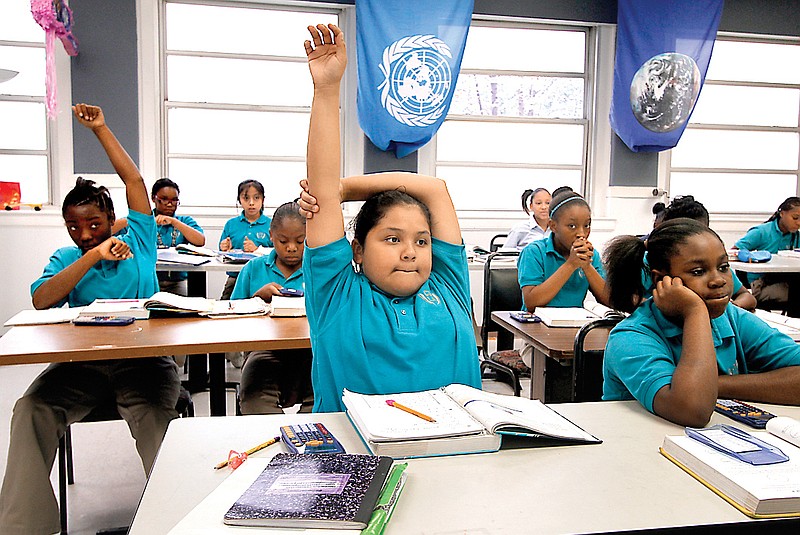Before Ed Davis left Howard School of Academics and Technology, his boss and co-workers warned him.
He was giving up a biology teaching job he enjoyed to serve as the operations director at Ivy Academy, the environmentally themed public charter school in Soddy-Daisy.
He would be the fourth person to fill the position in less than two years.
"They told me to wait and see if [the school] would last," he said, laughing.
But Davis is a risk-taker, and believed so strongly in the school's unique mission of outdoor learning, he was willing to work through its growing pains.
"They thought I could come in and not just be a Band-Aid, but be part of the solution," he said. "Nothing like this exists in Tennessee, and I wanted to be a part of that."
In their second year of operation, both Ivy and all-girls charter Chattanooga Girls Leadership Academy have had their share of struggles. With only ninth- and 10th-graders on campus so far, Ivy's "classrooms" are lined up next to one other inside three portable buildings, partitioned off by canvas-covered dividers. The school is out of space and looking into options for more permanent buildings.
And always in need of extra money, the school at one point was having trouble keeping up with payroll.
Meanwhile, at CGLA, administrators dealt with significant teacher turnover last year and now are bracing for their first year's standardized test scores, which they expect to be low.
Their facilities, too, are uncertain. Executive Director Anita Bordeaux said officials were unsure whether they would buy the James A. Henry building they're in from the Chattanooga Housing Authority, or look for a new location.
Bordeaux, who took over the school last summer, said developing a "brand, a culture of achievement," has taken a while.
"Last year, it didn't look like a school," she said, adding that she has put a copy of the school's mission statement in every classroom, and the creed in the school's entryway.
"We're developing a very obvious identity and culture of the school, so students know what it means to be a student at CGLA," she said.
Only one teacher at CGLA left at the end of last school year, and middle school English teacher Stephanie Brewer said the stability has helped.
"[The turnover] is always pretty disruptive to a team. This year it seems like we have more unity of vision. ... This year has gone more smoothly."
But, she said, building a school from scratch requires a lot from its teachers.
"It's a lot of work, and requires some commitment that maybe a more well-established school wouldn't have," she said. "That first year, we were really trying to find the right fit."
Marco Guerrero, a Spanish teacher at Ivy, said one of the biggest adjustments is just getting some of the students from urban environments used to being outside. Classes often are held in the woods or by the nearby creek, and sometimes during overnight camping trips, he said.
Being in an outside environment that may be unfamiliar to students helps clear their minds, Guerrero said.
"Classes are one-and-a-half hours long, so sometimes we work for 20 to 30 minutes, and then go on a 10-minute walk; it's kind of a transition," he said. "I never realized how important recess and PE and long lunches were," he said.
And most of the administrative and operational kinks the charter schools continue to work through seem mostly to be lost on their students.
"The learning is better here, because it's all girls and I'm not focused on anything else," said CGLA sixth-grader Jestiny Desmond, 11. "There are smaller classes, so it's easy for [teachers] to focus on me."
Jessika Chubb said Ivy Academy feels like a family.
"It was good enough for me to come back. It's better to interact with the teachers because it's so small," said Chubb, a sophomore at Ivy, where the largest class has 14 students.
Still, Hamilton County Board of Education Chairman Everett Fairchild said the board, which has the authority to close either school if one does not meet the demands of its charter, hasn't heard much about either operation, except that Ivy was having financial trouble.
"As long as there's concern about finances, there's some concern," he said.
But Hamilton County Schools Chief Financial Officer Tommy Kranz said both charter schools are required to turn in an audit of their finances later this year, and he "didn't expect anything negative."
The school board also recently approved the charter of the elementary Chattanooga Charter School of Excellence, two separate single-sex schools that will operate under one roof, which is scheduled to open next fall.
